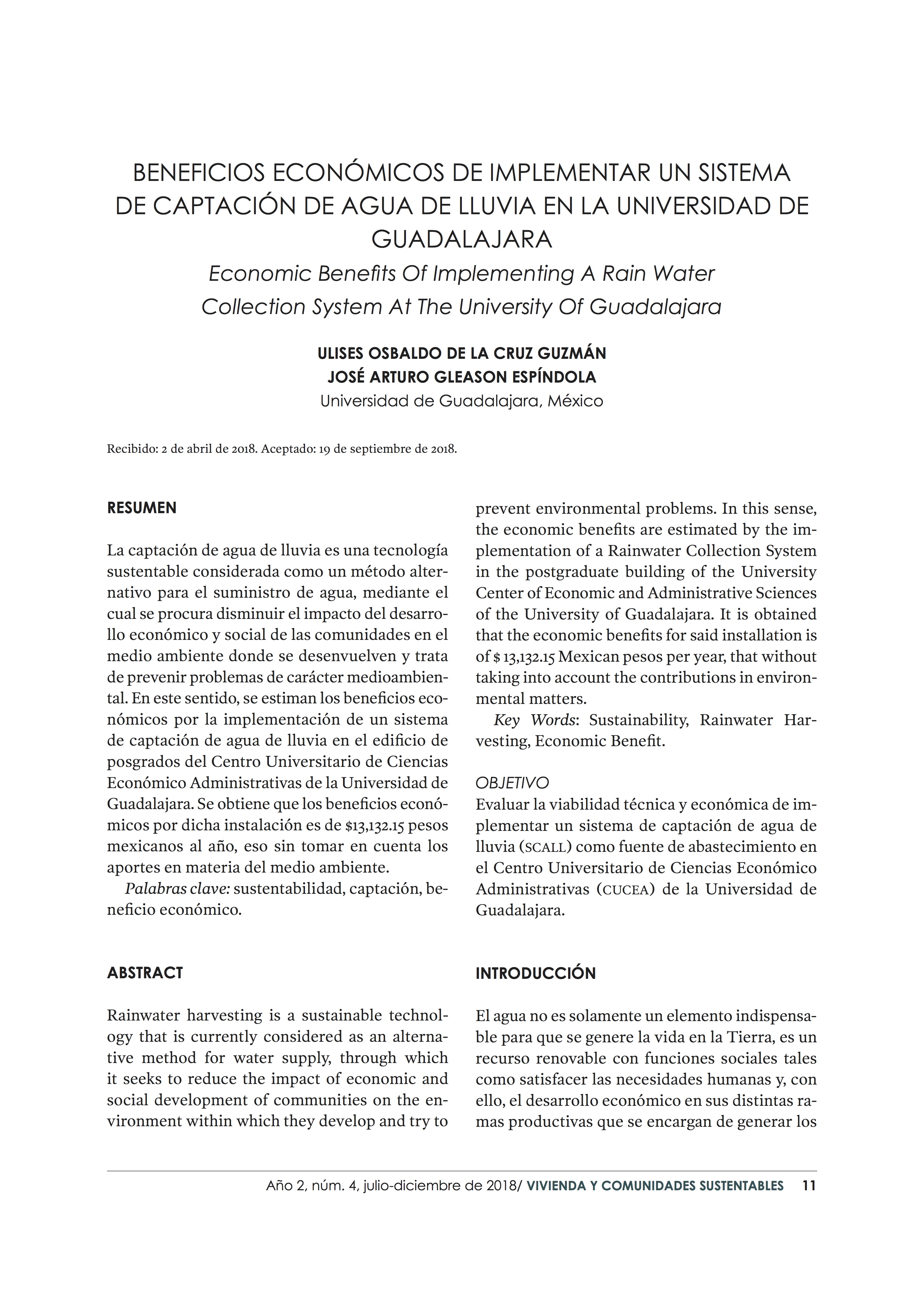Economic Benefits Of Implementing A Rain Water Collection System At The University Of Guadalajara
DOI:
https://doi.org/10.32870/rvcs.v0i4.63Keywords:
sustainability, rainwater harvesting, economic benefitAbstract
Rainwater harvesting is a sustainable technology that is currently considered as an alternative method for water supply, through which it seeks to reduce the impact of economic and social development of communities on the environment within which they develop and try to prevent environmental problems. In this sense, the economic benefits are estimated by the implementation of a Rainwater Collection System in the postgraduate building of the University Center of Economic and Administrative Sciences of the University of Guadalajara. It is obtained that the economic benefits for said installation are $ 13,132.15 Mexican pesos per year, without taking into account the contributions to environmental matters.Metrics
References
Arroyave Rojas, Joan A.; Díaz V. Juan; Vergara Diana M.; David M. Natalia. Evaluación económica de la captación de agua de lluvia como fuente alternativa de recurso hídrico en la Institución Universitaria Colegio Mayor de Antioquia. Producción + Limpia 6 (1) 76-84, enero-junio 2011. ISSN 1909-0455.
Beverage Marketing Corporation [En Línea]. The global multiple beverage Marketplace. [Fecha de consulta: 12 de mayo de 2017]. Disponible en: http://www.beveragemarketing.com/shop/ assets/PDFs/GlobalMBM2016.pdf
Brenner, Ludger. "Gobernanza ambiental, actores sociales y conflictos en las Áreas Naturales Protegidas mexicanas". Rev. Mex. Sociol [En línea]. 2010, vol.72, n.2 [Fecha de consulta: 2018- 05-18], pp.283-310. Disponible en: http://www.scielo.org.mx/scielo.php?script=sci_arttext&pi-d=S0188-25032010000200004&lng=es&nrm=iso.
Contreras Soto, Ricardo y Aguilar Rascón, Óscar. "Desarrollo sostenible (semblanza histórica)". Revista del Centro de Investigación de la Universidad la Salle [En línea], 2014 vol. 10, núm. 37 [Fecha de consulta: 16 de abril de 2018] Disponible en: http://ojs.dpi.ulsa.mx/index.php/rci/ article/view/102
Gleason Espíndola, José Arturo. Sistemas de agua sustentables en las ciudades. México D.F. Trillas. 2014. 331 p. Serie ISBN 978-607-17-1918-8.
Global Water Partnership. Integrated Urban Water Management. [En línea] Global Water Partnership Technical Committee (TEC) TEC BACKGROUND PAPERS NO. 16 [Fecha de consulta: 24 de abril de 2018] Disponible en: https://www. gwp.org/globalassets/global/toolbox/publi- cations/background-papers/16-integrated-urban-water-management-2012.pdf
Hyoungjun, K., Mooyung, H. y Ju Young, L. "The application of an analytical probabilistic model for estimating the rainfall-runoff reductions achieved using a rainwater harvesting system". Science of the Total Environment, 2012, vol. 424, pp. 213-218. ISSN: 0048-9697
https://doi.org/10.1016/j.scitotenv.2012.02.021
Kinkade-Levario, H. Desing for water, rainwater harvesting, stormwater catchment, and alternate water reuse. Gabriola Island: New Society Publishers. 2007.240 p. ISBN-10: 0865715807
Organización Panamericana de la Salud. Guía de diseño para captación del agua de lluvia. [En línea] UNATSABAR Lima 2004 [Fecha de consulta: 8 de mayo de 2018] Disponible en: http:// www.bvsde.ops-oms.org/bvsacd/cd47/lluvia.pdf Periódico Oficial. Gobierno del estado de Jalisco 13 de diciembre de 2016 [En línea]. SIAPA. [Fecha de consulta: 08 de mayo de 2018] Disponible en: http://www.siapa.gob.mx/sites/default/files/ doctrans/resolutivo2015_20150112164736.882_x. pdf.
SIAPA. Informe de actividades y resultados. [En línea] Dirección técnica. [Fecha de consulta: 13 de febrero de 2018] Disponible en: http://www. siapa.gob.mx/sites/default/files/doctrans/fe- brero_gra.pdf
Samano R., Gerardo. Diseño de un sistema de captación de agua de lluvia en la academia mexicana de ciencias. [En línea]. UNAM-Dirección General de Bibliotecas. [Fecha de consulta: 27 de abril 2017]. Disponible en: http:// www.ptolomeo.unam.mx:8080/xmlui/hand- le/132.248.52.100/12369
Selbig, W. R. y Balster, N. (2010). Evaluation of turfgrass and prairie-vegetated rain gardens in a clay and sand soil, Madison, Wisconsin, Water Years 2004-08. [En línea]. U.S. Geological Survey Scientific Investigations Report, 72. [Fecha de consulta: 7 de junio 2017]. Disponible en: https://pubs.usgs.gov/sir/2010/5077/pdf/ sir20105077.pdf
https://doi.org/10.3133/sir20105077
Stiglitz, J. La economía del sector público. Tercera edición. Barcelona. Antoni Bosch 2003. 742p. Serie ISBN 84-95348-05-5
UNESCO (2006). 2o Informe de las Naciones Unidas sobre el desarrollo de los recursos hídricos en el mundo, "El agua, una responsabilidad compartida". [En línea] World Water Assessment Programme (WWAP) [fecha de consulta el 22 de febrero de 2018] Disponible en http://www. unesco.org/new/en/natural-sciences/environ-ment/water/wwap/wwdr/wwdr2-2006/
Zegarra Méndez, E. Economía del agua: conceptos y aplicaciones para una mejor gestión. GRADE Group for the Analysis of Development. Lima, Perú. Arteta E.I.R.L. 2014. 221 p. ISBN: 978-9972- 615-79

Downloads
Published
How to Cite
Issue
Section
License
Copyright (c) 2018 Vivienda y Comunidades Sustentables

This work is licensed under a Creative Commons Attribution-NonCommercial-NoDerivatives 4.0 International License.
The authors who publish in this journal accept the following conditions:
In accordance with the copyright legislation, Sustainable Housing and Communities recognizes and respects the moral right of the authors, as well as the ownership of the patrimonial right, which will be transferred to the University of Guadalajara for its dissemination in open access. Sustainable Housing and Communities does not charge authors for submitting and processing articles for publication. Authors may make other independent and additional contractual agreements for the non-exclusive distribution of the version of the article published in Sustainable Housing and Communities (for example, include it in an institutional repository or publish it in a book) as long as they clearly indicate that the work is published for the first time in Sustainable Housing and Communities.





